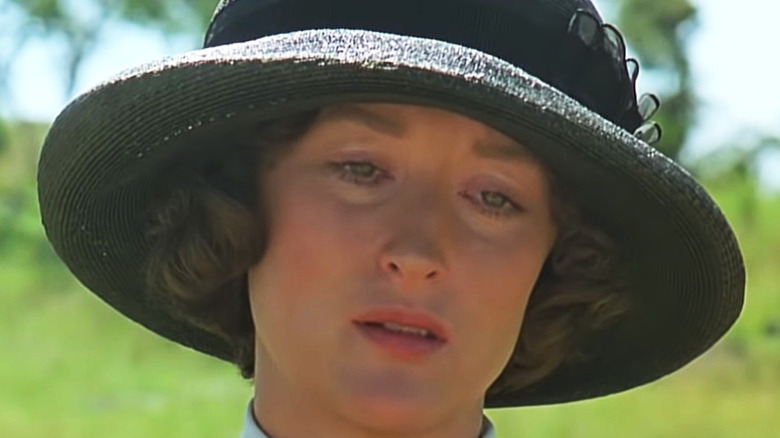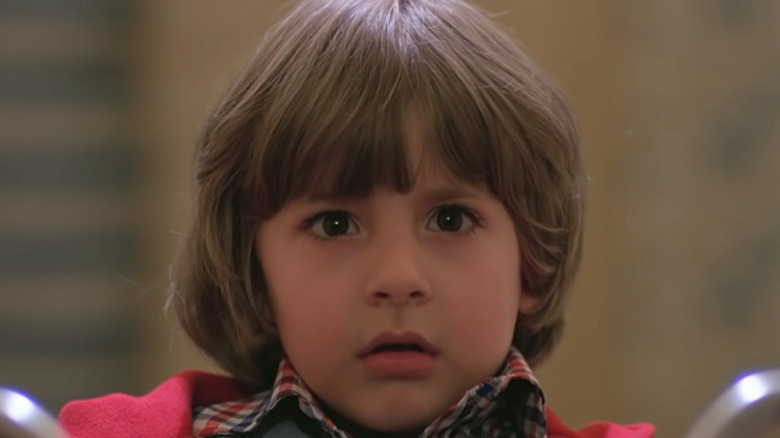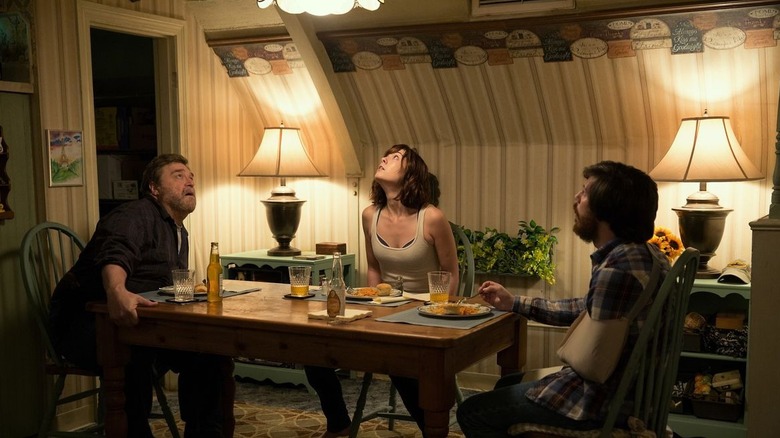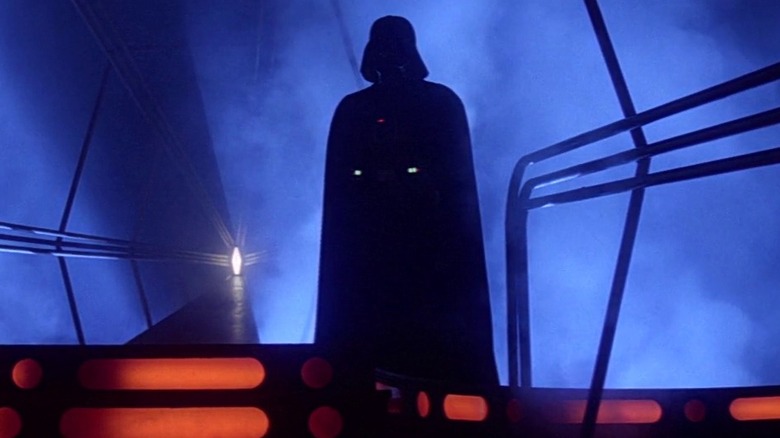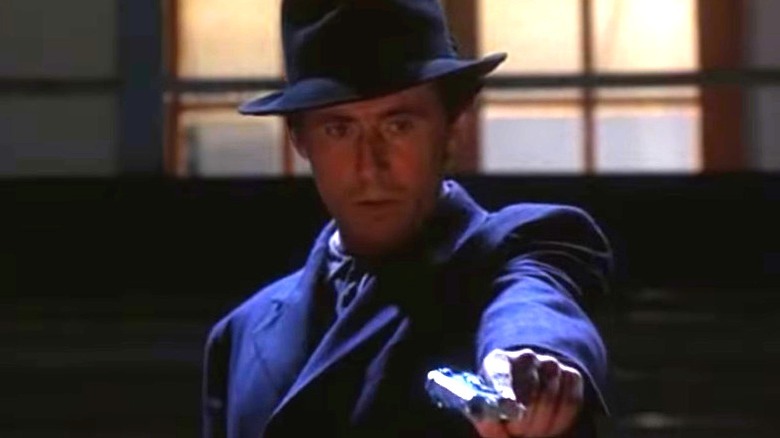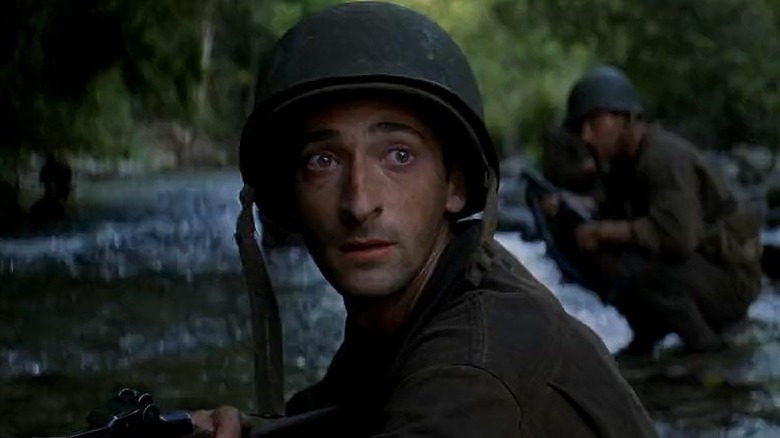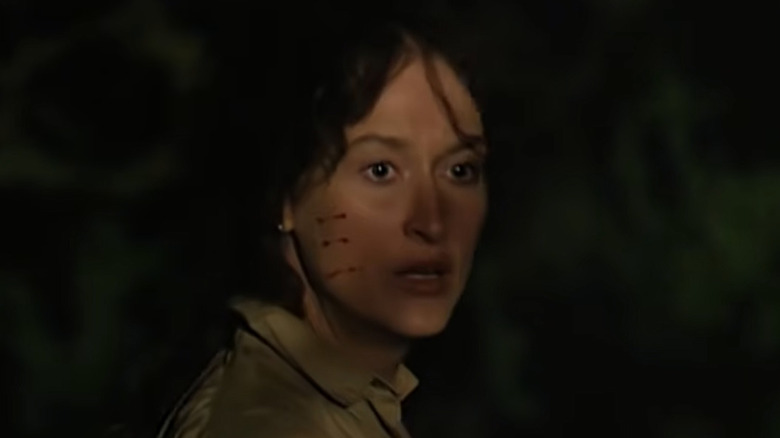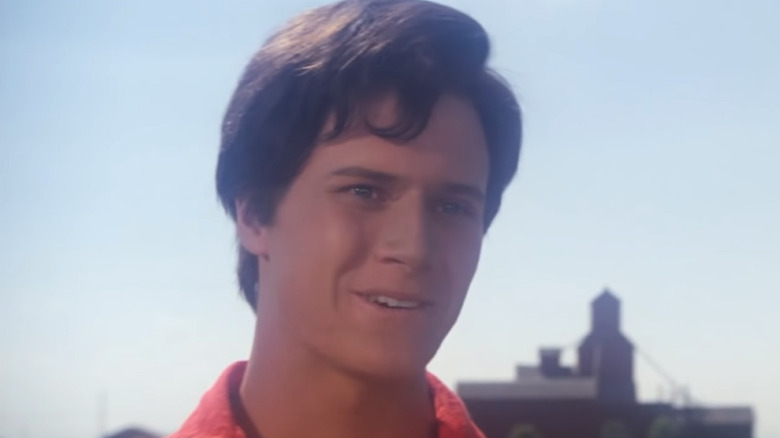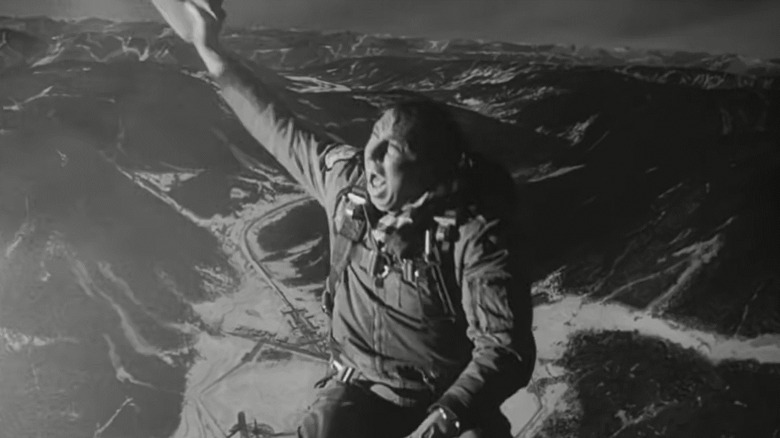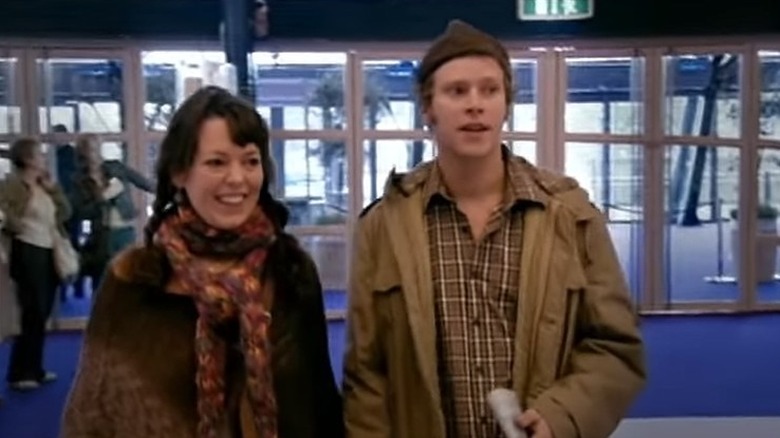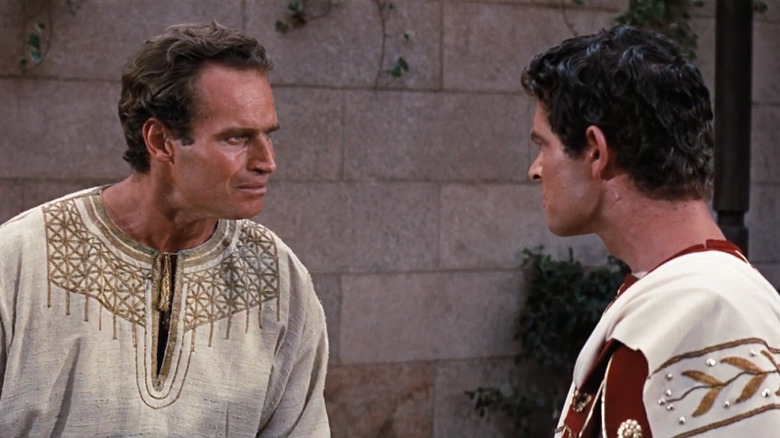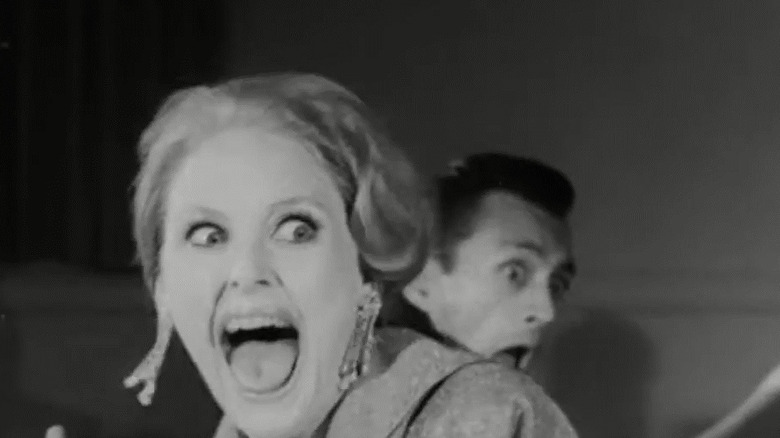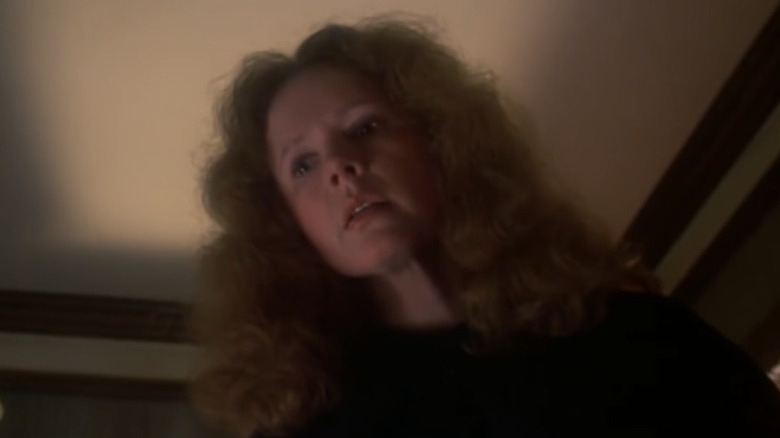Actors Who Were Lied To About The Movie They Were A Part Of
An actor puts a lot of work into developing a character. Even if they're not a method actor, they still have to fully understand the character in the script, research the part, and find their way into that person's headspace. If they find out that they have been lied to about some aspect of the role they worked so hard to embody, they'll probably not be happy.
Surprisingly, however, plenty of actors have been deceived about a movie they were in. Some thought they were the hero of the story, only to watch the finished film and realize how wrong they were; others didn't even know what genre of film they had actually made. Let's take a look at some actors who were lied to about the movies they were a part of, as well as the consequences of those lies — whether they resulted in a more genuine performance or some seriously hurt feelings.
Danny Lloyd in The Shining
"The Shining" is often ranked among the scariest films ever made, but actor Danny Lloyd, who played five-year-old Danny Torrance, was completely protected from the terror on set. Director Stanley Kubrick did not even inform Lloyd that he was making a horror film, and he made sure that the boy was not around for the filming of the scariest scenes.
To Lloyd, "The Shining" was simply a drama, and he only has good memories from the set. He even hung out with Lisa and Louise Burns, the young actresses whose characters wanted to play with him "forever and ever." Stanley Kubrick has become infamous for his harsh treatment of Shelley Duvall, who played Wendy Torrance, but Lloyd's experience with him was much different. "Stanley was great," Lloyd commented in a 2017 interview with The Guardian. "I remember him playing ball with me, playing catch, stuff like that."
When Lloyd finally did get around to watching the film, he said it simply felt like a "home movie" instead of a horror movie. Lloyd only acted in one other project, but it's good to know that he wasn't as scared by "The Shining" as most audiences were.
Mary Elizabeth Winstead in 10 Cloverfield Lane
The 2016 psychological horror film "10 Cloverfield Lane" was not your standard sequel. The film, which the actors knew as "Valencia," was tweaked just a bit so it could be woven into the "Cloverfield" universe — which apparently wasn't originally part of the plan. As a result, actress Mary Elizabeth Winstead, who played Michelle, only learned that she was in a "Cloverfield" film after production had wrapped.
It was producer J.J. Abrams who ended up revealing the truth to Winstead, shortly before she saw the film. It's only fitting that the actress didn't know the truth about the movie until then, because her character spends most of the film unaware if Howard (John Goodman) is telling the truth about the apocalypse.
Winstead was in disbelief when she first heard the truth about "10 Cloverfield Lane," saying in an interview with Collider, "I really didn't know what to think of it at first because I hadn't really wrapped my brain around it." Ultimately, though, she realized it was for the best, saying that the way the film tied into the first "Cloverfield" was "actually really smart."
David Prowse in The Empire Strikes Back
Everyone associates the great James Earl Jones with Darth Vader, which makes sense since he's the one who voices the iconic "Star Wars" villain. However, it was stunt performer David Prowse who wore the Darth Vader suit in the original trilogy, and even he didn't get to know the character's full backstory.
In "The Empire Strikes Back," Darth Vader reveals himself to be the father of Luke Skywalker (Mark Hamill), turning the entire story on its head. It's one of the greatest and most famous twists in cinema history, so George Lucas and director Irvin Kershner were not taking any chances. They told Hamill the truth about the scene, but they gave Prowse a different line to say.
Hamill spoke on "The Graham Norton Show" about the difficulty he had with keeping the secret from his friends and co-stars Harrison Ford and Carrie Fisher, with Ford being quite upset when he learned the truth at the movie's premiere. Prowse has had plenty of less-than-complimentary things to say about his time working on "Star Wars" over the years, but he didn't seem too bitter about not knowing the big "Empire" twist, only offering praise for director Kershner when the film was brought up in an interview with SciFiNow years later.
Gabriel Byrne in The Usual Suspects
As the production of "The Empire Strikes Back" proved, keeping a big plot twist under wraps is not easy, but director Bryan Singer took "The Usual Suspects" one step further. For the majority of the movie, the audience is led to believe that lifelong criminal Dean Keaton (Gabriel Byrne) is criminal mastermind Keyser Söze, but they learn Söze's true identity in the film's famous twist ending. Apparently, even Byrne was lied to about that final surprise.
The film's frame narrative sees special agent Dave Kujan (Chazz Palminteri) questioning conman Roger "Verbal" Kint (Kevin Spacey) about the criminals he got caught up with, including Keaton. Kujan has been obsessed with tracking down Keaton for years, and there's even a sequence where he imagines Keaton as Keyser Söze, dressed in Söze's signature trench coat and hat. It's easy to see why Byrne was so convinced that his character was Söze, considering he'd actually been filmed in the villain's outfit.
Byrne was not happy when he saw the real ending of "The Usual Suspects," and he hashed out his issues with Bryan Singer in the parking lot at the premiere of the film, according to Kevin Spacey. It apparently wasn't just Byrne who was deceived either, as Spacey explained, "Bryan Singer had successfully pretty much convinced most of the cast that they were Keyser Söze, so everyone thought it was going to be slightly different."
Adrien Brody in The Thin Red Line
Terrence Malick has made some of the most acclaimed films of all time, from the stark and haunting "Badlands" to the enigmatic "The Tree of Life," but he doesn't have the best reputation among actors. Most movies evolve a bit from the page to the screen, but Malick is known to make drastic changes in post-production without even telling the actors.
No one got hit with this practice worse than Adrien Brody in "The Thin Red Line." Brody was an up-and-coming actor when he was cast as Cpl. Geoffrey Fife, the lead in Malick's World War II drama. The 24-year-old Brody took his parents to see the film, only to discover that he was barely in it. The film was a huge critical success, but Brody, as he said in an interview with The Guardian, was "publically humiliated." It was a tough blow for Brody, but he would bounce back just a few years later when he won an Oscar for "The Pianist."
George Clooney, who also had his role greatly reduced in "The Thin Red Line," learned to laugh about his misfortune, as shown in a 2012 Oscar Roundtable. Another actor at that Roundtable, the late Christopher Plummer, was still bitter about having scenes cut from Malick's 2005 film "The New World," and even said that Malick "ha[s] got to get [him]self a writer." More than anything, however, Plummer and Clooney felt bad for Brody having his role reduced.
Meryl Streep in Out of Africa
There are plenty of directors who might think they can get away with lying to one of their actors, but lying to Meryl Streep takes some serious guts. "Out of Africa" director Sydney Pollack didn't lie to her about her character or the script, though — he allegedly lied to her about her safety.
An iconic moment in the film sees Streep fighting off a lion, which Streep has said was an extremely challenging scene to film. According to an interview with the Oscar-winning actress, the lion just wouldn't move whenever it was leashed. Camera trickery would have ultimately hidden the leash, but the lion wouldn't cooperate, and shooting was about to wrap. Pollack and the crew were getting impatient, so Pollack decided to unleash the lion on Streep without telling her.
Streep was understandably still floored by the "Out of Africa" incident years later, and the fact that Pollack never admitted to unleashing the lion, calling it a "creative memory" on Streep's part, only makes things worse. Clearly, Streep's character looks quite scared in the scene, but we think that one of the greatest actresses of all time could have conveyed fear just fine without having her life put on the line.
Jeff East in Superman: The Movie
No matter how many actors play Superman, many fans will probably tell you that Christopher Reeve's was the definitive version of the character, starting with 1978's "Superman: The Movie." However, Reeve wasn't the only actor to play the Man of Steel in the film, as 20-year-old Jeff East portrayed the teenage version of Clark Kent. Unfortunately, East was lied to about what his performance would look (or sound) like in the final cut.
The young actor was quite upset when he saw the movie and realized his dialogue had been dubbed over with Reeve's voice. East said in an interview with Fox4 News Kansas City, "It was very surprising to me when it happened, because I showed up at the premiere, and all of a sudden, it wasn't my voice." He even admitted that it led to some tension between himself and Reeve, but they would later bury the hatchet. A few years before Reeve's passing, East helped with an event for the Christopher Reeve Paralysis Foundation, which goes to show that the two actors were Supermen on- and off-screen.
Slim Pickens in Dr. Strangelove
Years before he benevolently lied to Danny Lloyd on the set of "The Shining," Stanley Kubrick was lying to a different actor about what genre of movie he was in. The 1964 film "Dr. Strangelove or: How I Learned to Stop Worrying and Love the Bomb" is a hilarious pitch-black comedy about the threat of nuclear war. But one actor wasn't even aware it was a comedy.
The film cuts between three primary different locations — an Air Force base, the War Room in the Pentagon, and a B-52 bomber. The pilot of the bomber is Major T. J. "King" Kong, an over-the-top cowboy type who believes he has to save the day by dropping the bomb. Peter Sellers played multiple roles in the film, and he was supposed to play this one as well. However, after Sellers suffered an injury, Kubrick simply decided to bring in western actor Slim Pickens, who acted like a cowboy even when he wasn't shooting a movie. In a documentary about the making of the film, co-star James Earl Jones and others confirmed this fact about Pickens' behavior.
Kubrick didn't bother telling Pickens about the satirical tone of the film as a whole, because the cowboy was able to perfectly embody the role just by being himself. This authentic performance, delivered without a hint of personal irony, did more for the satire than a contrived portrayal ever could have.
Olivia Colman and Robert Webb in Confetti
Lying to an actor to get a more genuine performance is one thing, and lying about the size of a role is another, but deceiving an actor when they are at their most vulnerable is taking things a bit too far. Sadly, this is exactly what happened to two actors on the set of the 2006 film "Confetti."
"Confetti" is a mostly forgotten British comedy that features one of the first film performances of Oscar winner Olivia Colman. She and comedian Robert Webb played naturists who wanted to have a wedding in the nude, and the two actors were promised that the nude scenes would be blurred out. It turned out that the filmmakers lied to them, and Colman and Webb were understandably livid about seeing their naked bodies on screen.
Colman was never the same after the deception, telling The Guardian, "I now never trust anybody. I love people, I believe in the goodness of people, but ever since that, there's a bit of me that died." Speaking to the lingering trauma of the experience, she added, "I didn't sleep for a year." Ultimately, Colman attempted to sue the filmmakers, but this endeavor came too long after production had wrapped, and Webb just wanted to move on. After some initial anger at her co-star for not wanting justice served, Colman saw his point of view and dropped the suit.
Charlton Heston in Ben-Hur
When it comes to epic movies from the Golden Age of Hollywood, they don't come much bigger than "Ben-Hur." The title character was played by Charlton Heston in one of his best-known roles, but there was one thing about Heston's character that he himself was unaware of.
In the film, Judah Ben-Hur finds himself at odds with his old friend Messala (Stephen Boyd), but uncredited writer Gore Vidal didn't think that Messala's motivation was strong enough, so he instructed Stephen Boyd to play Messala as a former romantic partner of Ben-Hur's. Vidal spoke about this in "The Celluloid Closet," a documentary about LGBTQ+ characters in film and how they have been portrayed over the years.
Vidal called the reunion scene between the two characters a "love scene," but Heston always denied any romantic undertones. The truth was, however, that the Ben-Hur actor was simply kept in the dark about his character's past, because director William Wyler apparently thought it would cause the famously conservative Heston to "fall apart."
Absolutely everyone in The Creeping Terror
These days, the 1964 film "The Creeping Terror" is best known for being featured on a famous episode of "Mystery Science Theater 3000." The low-budget monster flick features a ridiculous-looking alien creature that eats people very slowly, but the production of the film was somehow even more bizarre than the film itself.
Director and star Vic Savage lied about his name, lied about his budget, lied about the dialogue, and lied about pretty much everything else involved in the production of the film. That's because "Savage" wasn't a film director at all, but rather a con man who also used the name Art Nelson. For a small fee, investors could appear as actors in the film and get eaten by the titular Creeping Terror.
For the most part, though, the performances of the actors were seen and not heard: Since the sound equipment was destroyed in the course of production, Savage was required to dub over the film with narration. Instead of sticking around and explaining to all of his investors why they would never see a dime of their money, Savage took the money and ran, never to resurface.
Piper Laurie in Carrie
There are countless Stephen King adaptations that have been brought to the big screen over the years, but "Carrie" was the one that started it all. The 1976 horror film features a truly terrifying climax where Carrie White gets revenge on all of those who have wronged her, but actress Piper Laurie didn't find the film scary at all.
Laurie, who played Carrie's abusive, ultra-religious mother Margaret White, wasn't even aware of what kind of film she was making. When she first got the script, she was confused and even thought the concept was "just stupid" — until her then-husband explained that director Brian De Palma was known for injecting humor into his movies. As Laurie said in an interview with the Television Academy Foundation, this led her to believe that the film was "a satire of some sort."
Laurie's portrayal of Carrie's mother is gloriously over-the-top, which only serves to make her scarier; you never know what she'll do next. Even after De Palma finally told her that "Carrie" wasn't the laugh-fest she thought it was, Laurie still played the character as an "evil witch" role — which she said was "freeing and fun to do," according to an interview with Hollywood Chicago. Laurie may be one of the only actresses who lied to herself about a role, but she created one of the most memorable antagonists in horror history and even received an Academy Award nomination. Maybe she had a better read on the character than anyone.
